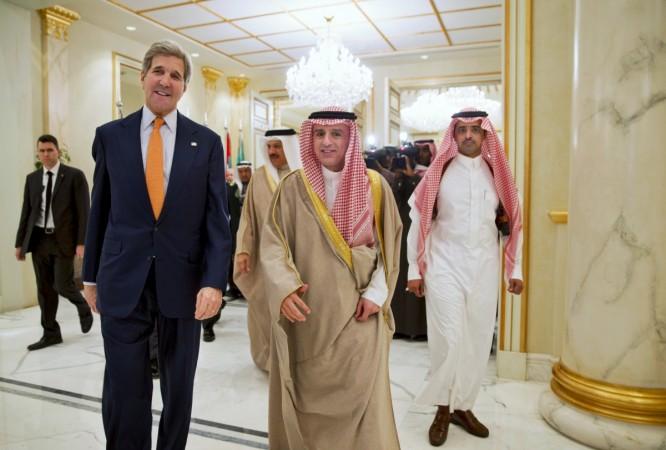
US Secretary of State John Kerry said on Saturday he was confident the Syria peace talks would proceed, after he held talks with Gulf Cooperation Council (GCC) states in Saudi Arabia.
"We are confident that with good initiative in the next day or so those talks can get going and that the UN representative special envoy, Staffan De Mistura, will be convening people in an appropriate manner for the proximity talks that will be the first meeting in Geneva," he told reporters in Riyadh.
The Syria peace talks are planned to begin on 25 January in Geneva, but there is uncertainty around the date, partly because of a dispute over who will be part of the opposition delegation.
Kerry said major countries would convene after the first round of negotiations.
"I won't announce a date, but we all agreed that immediately after completion of the first round of the Syria discussions, the International Syria Support Group will convene, and that will be very shortly, because we want to keep the process moving," he said.
Peace efforts face huge underlying challenges, including disagreements over President Bashar al-Assad's future and worsening relations between Saudi Arabia and Iran.
Tensions between the two regional rivals escalated this month after the Saudi execution of a Shiite Muslim cleric. That triggered an attack by Iranian protesters on the Saudi embassy in Tehran embassy, leading the kingdom to cut diplomatic ties.
"None of us are under any illusions that obstacles don't still exist to trying to seek a political settlement in Syria," Kerry said. "We know its tough. If it were easy, it would have happened a long time ago."
Saudi Foreign Minister Adel al-Jubeir said his country was working with the US to find ways to remove Assad from power. He downplayed any change in US-Iran relations after an agreement with world powers on Iran's nuclear programmed led them to lift sanctions on Iran.
"We work with our American friends on ways to remove Bashar al-Assad from Syria and move the country towards a better future," he said. "I don't see coming together of the United States and Iran, as some of the pundits have described it. Iran remains the world's chief sponsor of terrorism."
Kerry said the lifting of sanctions presented an opportunity to work together with Iran to address some of the worries Saudi Arabia and other countries had.
"Now we have the ability to begin to work together to address the concerns that Saudi Arabia and other countries have and that we have," he said.
Kerry met earlier in Riyadh with representatives of the six nations of the GCC — Saudi Arabia, Bahrain, Kuwait, Qatar, Oman and the United Arab Emirates. He is due to hold talks with Riad Hijab, chair of the Syrian opposition's High Negotiations Committee, formed in Riyadh last month.


!['Kaise ho bhai..': PM Modi shook hands with Akshay Kumar at a media summit in Delhi [Watch] 'Kaise ho bhai..': PM Modi shook hands with Akshay Kumar at a media summit in Delhi [Watch]](https://data1.ibtimes.co.in/en/full/806317/kaise-ho-bhai-pm-modi-shook-hands-akshay-kumar-media-summit-delhi-watch.jpg?w=220&h=135&l=50&t=40)


!['Kaise ho bhai..': PM Modi shook hands with Akshay Kumar at a media summit in Delhi [Watch]](https://data1.ibtimes.co.in/en/full/806317/kaise-ho-bhai-pm-modi-shook-hands-akshay-kumar-media-summit-delhi-watch.jpg?w=220&h=135)


